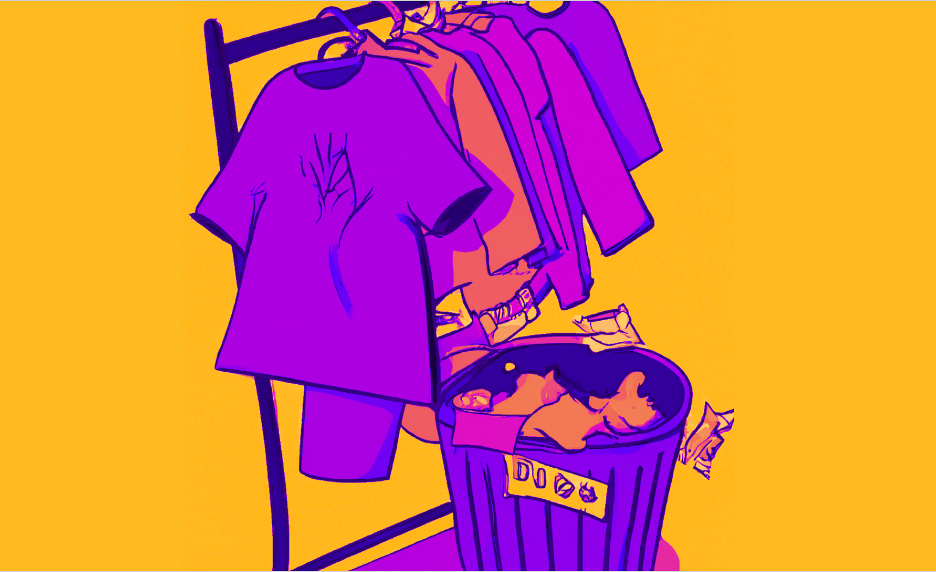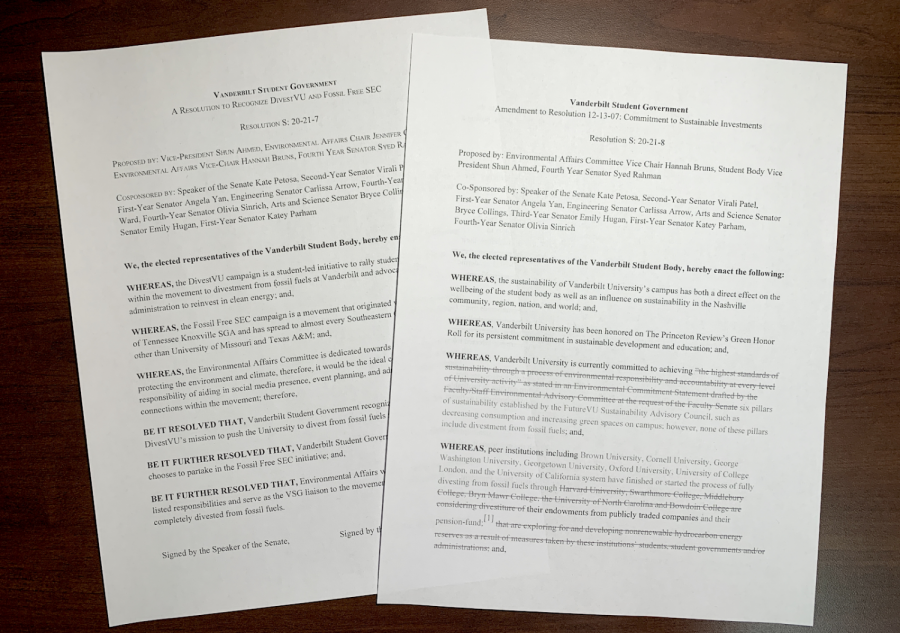I’m going to a wedding in June, and I’ve been dress shopping for it all week. After searching for hours, I finally found one that called my name: Draped in lace, it screamed spring in a perfect pastel yellow, and it fit me like a glove. Unfortunately, it cost over $300.
I wanted to search for a dupe of the dress, but I didn’t. Why? Because I, like many Vanderbilt students, have taken an environmental science class, which introduced me to the effects of the garment industry and has shown me the problems with fast fashion.
I’ve always been obsessed with collecting material things — clothes, makeup, even gel pens. In my mid-teens, I indulged in fast fashion because most brands had endless pages of items with new styles available every day, and I could easily justify purchases with their cheap prices. However, I’ve gotten better at not buying that random but oh-so-cute top that pops up on my Instagram story via the algorithm. I’m proud to say that I’ve committed to not buying fast fashion, and everyone at Vanderbilt should do the same given how the fashion industry is responsible for multitudes of human and environmental rights abuses.
Environmental impacts
Fast fashion and the garment industry at large have devastating effects on the environment. The poorer the working conditions are in the fashion sector, the worse the manufacturing process is for the environment. The Great Pacific Garbage Patch is currently the largest of the five plastic accumulation zones worldwide that act like vortexes, sending microplastics into the deepest parts of the ocean. The Ocean Cleanup reported that the surface area of this zone alone covers 620,000 square miles — more than twice the size of Texas and three times the size of France.
While the textile industry is a significant contributor to microplastic pollution, it has other devastating impacts on our environment. Around 20% of wastewater worldwide comes from fabric dyeing, and synthetic textiles are responsible for 35% of all ocean microplastics. The fast fashion industry uses even more synthetic fabrics than the industry average, utilizing synthetic textiles for at least 70% of its products.
Microplastics make their way into our food in many ways, such as through fish that digest them in contaminated oceans. Similarly, wastewater from textile production contaminates our water sources and land-based food sources that require watering the soil with microplastics. They even pollute the air through construction and material production, such as producing clothes, furniture and water bottles. Scientists believe that microplastics in our bloodstream can increase the risk of cancer, heart attack and stroke, among other health complications.
Microplastics are only part of the problem. The U.S. Department of Labor reported that the fashion sector produces more carbon emissions than all international flights and maritime shipping combined. On its current trajectory, the fashion sector will account for a shocking 25% of the total global carbon budget by 2050.
Social impacts
The fashion sector also grossly violates human rights in underprivileged countries, disproportionately affecting already marginalized demographics. Today, there are an estimated 160 million forced child laborers working. Half of these child laborers work in textile manufacturing. Women face human rights violations too: They make up 75% of garment workers and they report facing gendered violence and harassment. Only 2% of all garment laborers earn a living wage. Popular fast-fashion brand SHEIN pays workers only 4 cents per garment and forces its workers into 18-hour workdays, with only one day off per month.
The fashion industry also fails to provide safe working conditions. In 2012, a factory fire at Ali Enterprises in Pakistan killed around 300 garment workers. Similarly, in 2013, Rana Plaza, a commercial garment building in Bangladesh, collapsed, killing over a thousand workers and injuring thousands more. One survivor, Shila Begum, noted that the weight of the concrete crushing her body resulted in the removal of her uterus. Soon after, over a thousand factories used by fast fashion companies were inspected and 80,000 safety-related issues were found.
It is important to note that we cannot consider the social impacts of fast fashion in isolation. According to former UN Special Rapporteur on climate change Ian Fry, the G20 accounts for 78% of emissions from 2010 to 2020 but other poorer countries bear the majority of the consequences for it. Therefore, those suffering human rights abuses are often also suffering the worst from its environmental impacts because the countries from where labor is outsourced are also the ones experiencing the worst climate change.
Our role as college students
By buying fast fashion, we are ignoring the exploitation of the environment and workers in the fashion industry and enabling a system that has gone unregulated for far too long. As Vanderbilt students, we are privileged to have access to the education and resources needed to allow us to seek change in the world. We must use that privilege for good instead of contributing to the degradation of the environment and international human rights by refusing to adjust our shopping habits. The neverending desire to accumulate material things is eating away at our morals. It’s time to ditch the cheap clothing and spend more money in favor of human rights and environmental justice.
It can be hard to justify spending hard-earned money on more expensive items, especially for students of low socioeconomic status. Moreover, a 2018 study conducted by Jin Su and Aihwa Chang found that college students are especially susceptible to the allure of fast fashion because classes and social activities leave little time for earning money, and wearing clothes that are “in style” contributes to socializing. However, waiting to purchase something and saving up to buy a higher-quality item is better for human rights, the environment and your bank account. Fast fashion may have a lower sticker price, but the poor quality of the clothing requires consumers to buy replacements more frequently. As a result, consumers could spend more money in the long run than if they invested in higher-quality items.
We are morally obligated to help those in need, especially when the clothes on our backs contribute to the problems they face.










